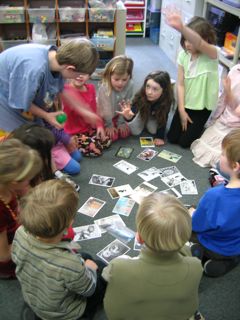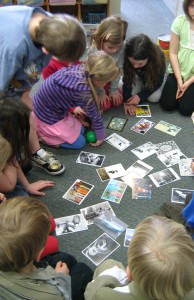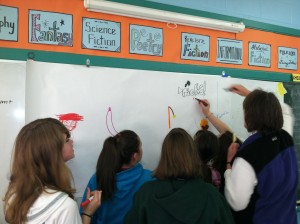
Mar 20, 2010 What is Experiential Education?
What is Experiential Education? How is it relevant to my work as an educator or counselor?
The experiential approach to education and group work is based on the idea that change and growth take place when people are actively (physically, socially, intellectually, emotionally) involved in their learning rather than just being receivers of information. The philosophy of experiential education was promoted by John Dewey, an educator and philosopher in the early 20th century along with others during the progressive movement in education. The progressive movement aimed to move educational practices out of what many thinkers believed had become the narrow and limited realm of modern education.
John Dewey felt that “modern education” was ignoring the common sense observation that people learn most when they are actively involved in their learning and find the material relevant and attractive in some way. He emphasized that learners need to feel a sense of control and ownership over learning situations. A tenet of experiential education is that in order for learning to truly occur, students should be provided with opportunities to reflect on their learning experiences so they relate, connect and transfer to real life. This philosophy emphasizes the importance of focusing on the whole person in education including one’s physical, emotional and intellectual growth. Learners are encouraged by educators to experiment and think independently with support and guidance from educators.
These ideas put forward nearly a century ago are now being supported by studies of the brain and how people learn. In the past few decades, new technologies such as brain imaging have become available, allowing neuroscientists to identify optimal conditions for learning. Many educators call approaches that take advantage of these optimal conditions for learning “brain-based” learning.
Brain-based approaches emphasize many of the same principles of experiential education such as the value of combining physical action and reflection in learning, giving learners choice and control over their learning and creating novel and relevant learning situations. Studies of the brain and learning are showing that physical, emotional and social involvement in learning increases engagement and retention (Sousa, 2005, Willis, 2010). Like experiential educators, proponents of brain-based learning stress the importance of creating opportunities for reflection on learning experiences to apply them to future learning, and regular feedback from peers as well as teachers.
Principles of Experiential Education
- In experiential education the learner is a participant in their learning rather than just a “receiver” of information.
- Experiential education or therapy is active: engaging a person emotionally, socially and physically as well as intellectually.
- Learners are actively engaged in solving problems, using creativity, posing questions, interacting with others, experimenting, taking responsibility for themselves and others and finding meaning in their experiences.
- The learner needs to feel intrinsically motivated to learn.
- Students must perceive internal freedom and independence. They need to feel like they have the ability to make choices about their experience, take responsibility in the experience and feel in control of their learning.
- Relevancy is imperative to the learner- lessons and concepts taught must feel relevant and meaningful to the learner. Lessons need to have intrinsic value and relate to real life both in the future and present situation.
- In order to truly learn, participants must have time to reflect on experience. Reflection involves thoughtful time connecting the experience to real life situations. When learners develop reflective skills, they are practicing the skill of insight that will help them in many areas of their lives.
- Experiences should be carefully chosen to meet the needs and differing styles of the learners. This requires creativity, flexibility and intention from the teacher.
- Effective teachers create opportunities for reflection on learning experiences- helping create lasting lessons meaning and relevance. Processing helps the learner transfer these skills to other parts of their life.
- Experiential educators encourage spontaneous learning; students may take lessons in many different directions. Effective teachers “go with the flow” and move with the lessons the group is creating. The educator structures appropriate experiences but they must be flexible, and act as a guide and role model. A teacher initiates learning- the student takes it from there.
- Learners need to feel fully valued, respected and supported.
- An atmosphere of fun helps open doors to learning. Learners can practice communication, cooperation, trust, problem solving and insight in a milieu of fun.
- Educators must sequence lessons so they can be built upon each other. John Dewey stated that one can learn from any and all experiences, but growth through experience must create conditions for future growth.
References
McDermott, J. (1981) The Philosophy of John Dewey. Chicago: University of Chicago Press.
Stanchfield, Jennifer (2007) Tips & Tools for the Art of Group Facilitation OKC, OK: Wood-n-Barnes Publishing
Willis, Judy. (2006). Research-Based Strategies to Ignite Student Learning. Alexandria, VA: ASCD
Sousa, David. (2006). How the Brain Learns. Thousand Oaks, CA: Corwin Press.





michael cardus
Posted at 04:04h, 22 MarchExperiential learning has capabilities that are applicable in learning with the brain in mind. As well as understanding how modern education is not set for people who cannot sit in follow directions to succeed.
Yet for experiential ed. to be successful practitioners MUST work to illustrate relevancy and competency in what is being done. Many of us do not focus on the brain based and learning component of EE, and just “play games”.
This game playing view comes from EE people not learning about the craft to develop deep content knowledge.
Meaning Just like education in order for success utilization one needs deep content knowledge, relevancy to subject, direct transference and application to subject.
Mentoring: Experiential Teaching in Action | Along the Lion's Path
Posted at 17:08h, 06 January[…] her blog article, Jen Stanchfield notes that experience is an idea that not only can be used as a learning […]